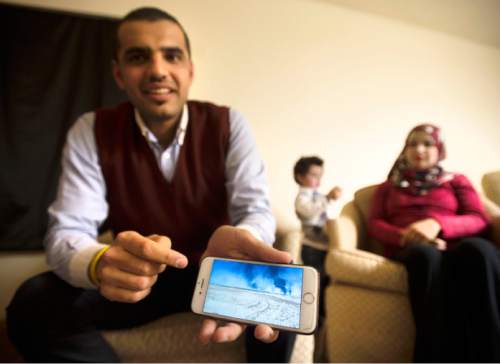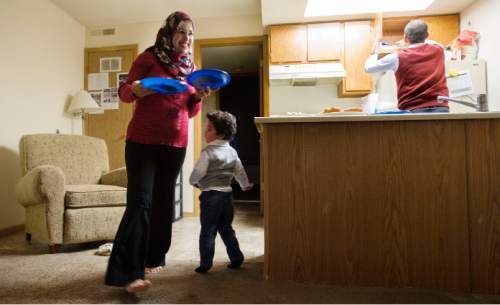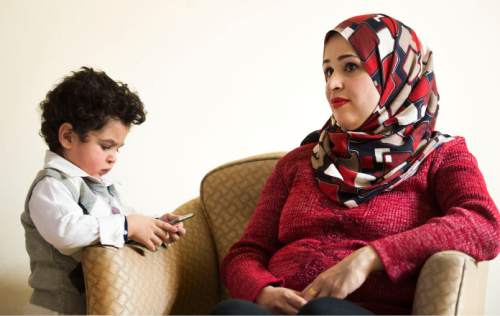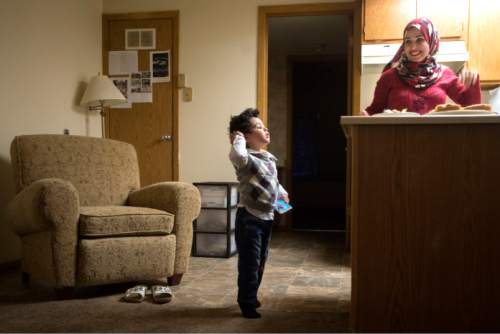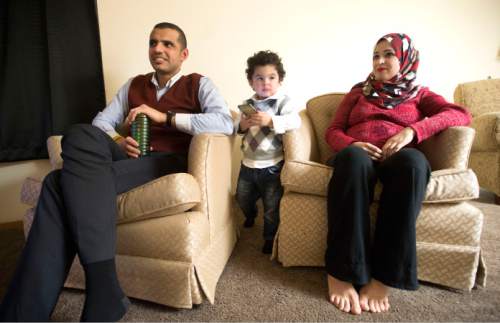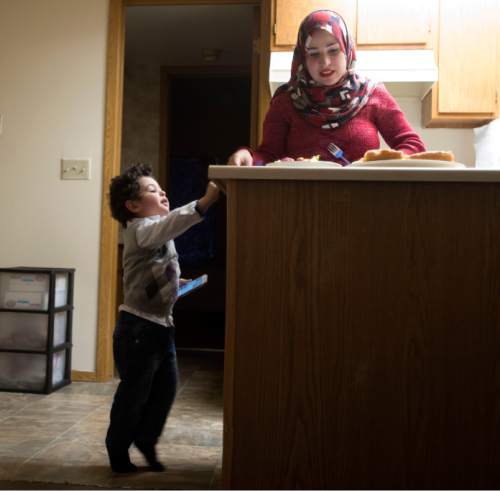This is an archived article that was published on sltrib.com in 2015, and information in the article may be outdated. It is provided only for personal research purposes and may not be reprinted.
A dad in what is now Israel gets a tip — from an angel, no less — that it's time to get out of town. The country is devolving into factions, and its leader has a murderous plan to wipe out a generation of male children.
So the alert father gathers his wife and tiny son, and together they steal away in the dead of night to Egypt.
The Holy Family's escape, as recounted in the Bible, is part of the Christmas story that Christians everywhere will celebrate Friday.
At its simplest, the yuletide narrative is the tale of every human family — mother, father and child. It expresses the lofty expectations and deep hope all parents hold for that squirming bundle of flesh in their arms.
It also symbolizes the plight of the least among us — from a bout with homelessness as the young couple anxiously hunted for a place to bed down in Bethlehem to the family's fearful and hurried exodus as refugees to the land of the pyramids.
It was, after all, their need to shield baby Jesus from harm that prompted Joseph and Mary to flee horrifying hatred.
Though they are Muslims, not Christians, Mohammed Alhareb and Sarah Alsahyem know that story well.
They have lived it.
The young husband and wife are modern-day refugees in Utah from Iraq, and it was the thought of their curly-haired toddler's future that finally impelled them to leave the only home they had ever known.
Every day in their country brought shootings, car bombs and chaos, says the well-spoken Mohammed in nearly perfect English, and it seemed to be getting worse.
"I could not find a safe place," the gentle 29-year-old dad says as his 2-year-old son, Ridha, climbs on his lap to play with a smartphone.
The father, mother and child arrived on American soil last December, landing first in Chicago. They then began searching the Internet for a new home that would provide the kind of security for their son that they so desperately desired.
They chose the Beehive State — after reading online about its strengths (high on families, low on violence, down on alcohol, up with religion) — and thus journeyed here to take up permanent residence in March.
Utah takes in about 1,100 refugees every year, most recently from places such as Iraq, Burma and Congo, says Danielle Stamos, who represents the state's Catholic Community Services (CCS) branch.
Refugee-resettlement groups such as CCS meet these newcomers at the airport, set them up in an apartment, and provide food, furniture, transportation, job training and, if necessary, English lessons.
Since Syria's civil war erupted, the state has resettled a handful of Syrian families. That number will likely rise next year.
Recent terrorist attacks in San Bernardino, Calif., and Paris have caused some Americans — including Republican presidential front-runner Donald Trump — to propose slamming the door to all Muslim refugees, a move Utah's governor has rejected.
Utahns have no need to fear refugees, Mohammed says. They are "not aliens from Mars."
They care about their kids, buy groceries, work for a living, go for walks, and fret about the future — and the impact of video games on their offspring.
"We are not that different," Mohammed says, "from American families."
They are, he says pointedly, "just people."
Looking out at the fresh snow — the first the family's ever seen — from his sparse Millcreek apartment, the Iraqi engineer has a clear sense of how far it is from his homeland.
Physically, culturally, emotionally.
—
Bombs falling like snow • Mohammed, the eldest of five siblings, was 5 years old when the first Gulf War — Desert Storm — was launched in 1990.
"I didn't know who was fighting, but if anyone walked in the street," he says, "there was a chance you could be dead."
The family lived in Basra, an oil-producing city of more than a million people a few hours south of Baghdad, where his mother was a teacher and his father was a commercial ship's captain, a job that took him away from home for long stretches. His absence left young Mohammed with an extra load of responsibility for home and family, as well as doing well in school.
"I was the man of the house when I was 10," Mohammed recalls. "I had to lock the doors, pay the bills, do the shopping. So much."
The boy began formal English study at school, later filling in those "extra words," American idioms and culture by watching television hits like "Seinfeld" and "Friends."
When the U.S., in 2003, began its second offensive against Iraq, bombs overhead became so constant, he says, "you got used to it — like snow here."
On at least two occasions, he was forced to stay at the university because it was too dangerous to make the short trip to his family house.
A professor was there one day and dead the next. Friends disappeared. Students were killed.
His wife, Sarah, the second youngest of six children, recalls she had an important high school exam on the day the American attack began. She went to school and found no one there. She wondered what happened.
She was not listening to the news, she says, just trying to focus on studying.
Families tried to go about their normal routines, but had to work around all the looting, burning, shooting and robbing.
Graduating from high school in the top 10 percent of his class meant that Mohammed could enter the prestigious but difficult college training to become an electrical engineer.
In 2004, though, just as he began at the university, the terrorist group al-Qaida infiltrated Iraq, Mohammed says, determined to undermine all attempts by the Americans to create a stable environment.
A year later, Shia and Sunni Muslims, who had lived there peaceably for decades, turned on one another.
"It was not the people," says Mohammed, who is Shia, "but the leaders."
After graduating in 2008, Mohammed took a job first with a Pepsi factory, then with the U.S. Army Corps of Engineers, supervising quality control for barracks, schools and hospitals.
In 2011, his work with the Army was finished.
"I didn't leave the Army," he says, ruefully. "The Army left me."
Worried about what his work with U.S. forces might mean and about the degenerating society around him, Mohammed began the process of applying for a "special immigration visa," granted to those who had worked with the Americans.
Meanwhile, Sarah finished high school, ranked in the top 5 percent of her class, and began an equally arduous study of petrochemical engineering. After graduating from the university, she was hired as a teacher's assistant, assigned to work with Mohammed's sister.
It was there they met in 2012.
Mohammed was dazzled by her intellect, smile and face; Sarah thought he was "funny and lovely."
They talked often on the phone, but did not "date" — in the American sense. That is not the Muslim way. Within two months, they were engaged. Four months later, they married on a magical night before 500 guests on one of his father's ships.
"She completes me," he says with a smile.
Sarah, who speaks English less confidently, nods and grins.
—
A fresh start • As their joint life began to blossom, however, the society around them seemed to be wilting.
The power was on for only about 10 hours a day. Temperatures reached 130 degrees or more. Cellphones had to be stowed in the refrigerator, or they would burn up. Pollution from the oil fields became oppressive. And the water? You didn't dare drink or even wash in it.
The rich could travel to Iran or Turkey for medical care; most others could not.
"Going to the hospital in Iraq," Mohammed says, "often means coming home more sick."
Then their son was born.
They named him Ridha, which means "blessed," and began thinking seriously about leaving.
The process took longer than usual, but finally they were able to escape.
Now, they live in an apartment complex that houses many other refugees, including a Pakistani family across the hall.
The couple relish their Utah experience — walking freely around the neighborhood, making friends of all faiths, and harboring dreams of an American future that includes a Mercedes for them and an Olympic gold medal in swimming for their son.
Sarah and Mohammed Skype every day with their families back in Iraq, each side sharing only positive news about their daily existence. Neither wants loved ones across the sea to worry.
"Iraqis always smile and laugh," Mohammed says, "no matter what difficulties they face."
They go weekly to the Al-Rasool mosque in Taylorsville, the area's first Shia-created community center, which is open to all Muslims.
Mohammed, who works part time helping other refugees at Catholic Community Services, says he now prefers helping other people to working with machines.
"This is the lesson I learned from all my years in Iraq," he explains. "No matter what is happening — tomorrow you have to wake up and live."
Sarah, 26, is pregnant with her second child, a daughter who will be named Sana, meaning "radiance" or "splendor."
Thus, their nativity story will begin a new chapter, this time as "strangers in a strange land" — but with much more hope.
Twitter: @religiongal —
Holy Family's flight by night
"... Behold, the angel of the Lord appeareth to Joseph in a dream, saying, Arise, and take the young child and his mother, and flee into Egypt, and be thou there until I bring thee word: for Herod will seek the young child to destroy him.
"When he arose, he took the young child and his mother by night, and departed into Egypt."
Matthew 2: 13-14


